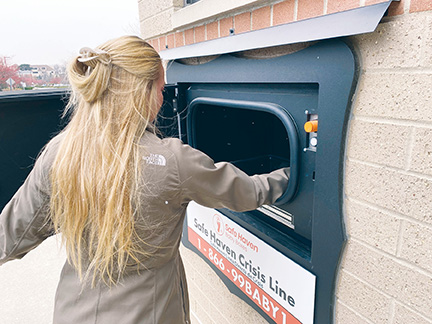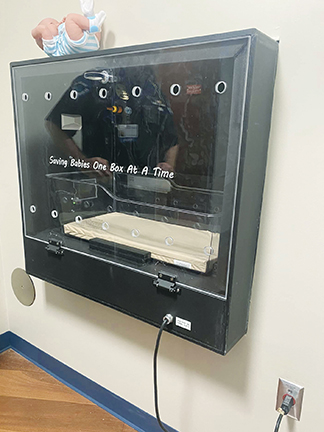By LISA EISENHAUER
Ronda Lehman, president of Mercy Health — Lima, won't be disappointed if the Safe Haven Baby Box installed in October next to the emergency room at Mercy Health — St. Rita's Medical Center in Lima, Ohio, is never used.

Lehman
While the box is a safe and discreet means for someone to anonymously surrender an infant, it is more "an outward sign that we are here for women who are in this very distressing situation," Lehman explains.
The Safe Haven box at St. Rita's is the 125th one installed nationwide and the first at a Bon Secours Mercy Health hospital. The nonprofit behind the boxes, Safe Haven Baby Boxes, says that since the first box was mounted in 2016, 21 infants have been surrendered in them.

Bassitt
One of the champions of the box at St. Rita's is Sarah Bassitt, a registered nurse in the hospital's special care nursery. As part of her studies to earn a doctorate in nursing from Northern Kentucky University, Bassitt did a research project on infant abandonment.
She found that there are demographic markers, such as low income and low educational achievement, among populations in which infants are more likely to be abandoned. She also found that, based on those markers, Lima and Allen County, where the city is located, had red flags. Lima, with a population of about 36,000, has a poverty rate of 24%, twice the national rate of 11.6%. In Allen County, about 9% of adults haven't finished high school or earned an equivalency diploma.
Before the Safe Haven box was installed at St. Rita's, the closest one to Lima was more than 40 miles away. "Having that patient population at risk in Lima and having that box available to them an hour away was a disservice to the community around where St. Rita's is," Bassitt says.
She also studied safe haven laws as part of her doctoral research. Every state has a version of the law in place to protect those who surrender unharmed infants. The laws have variations, such as whether those who surrender babies can remain anonymous and how old the baby can be, but they all say that any hospital can be a safe surrender site.

Cassie Gillette, an administrative assistant, checks out the Safe Haven Baby Box that Mercy Health — St. Rita's Medical Center in Lima, Ohio, installed next to its emergency department entrance. The box, one of 125 Safe Haven boxes nationwide, provides a way for someone to anonymously surrender an infant at a location where the baby will receive immediate attention.
Bassitt's findings not only convinced Lehman and the other administrators in charge of St. Rita's of the need for the baby box, they led to Bon Secours Mercy Health updating and standardizing its policies for the handling of surrendered infants systemwide. The new policies establish guidelines for what hospital staff should do — with separate tracks for hospitals with an obstetrics department and those without one — to ensure that the infants get proper care and that appropriate community agencies are alerted to the surrender.
Options, not judgment
Monica Kelsey founded Safe Haven Baby Boxes, which promotes awareness of Safe Haven laws and installation of the boxes. She says she was inspired after learning that she had been abandoned by her own biological mother.
On a visit to Cape Town, South Africa, in 2013 Kelsey saw a baby box at church. It took three years to come up with a workable design and to get the first box installed at the firehouse in Woodburn, Indiana, where she is stationed as a firefighter and paramedic.
"The hardest part, honestly, was getting people to understand that placing a baby in a box is a good thing, if a dumpster is the alternative," she says.

A clear panel offers staff at Mercy Health — St. Rita's Medical Center in Lima, Ohio, a view into the Safe Haven Baby Box. When the box is opened from the building's exterior portal, a silent alarm alerts campus police to check whether an infant has been dropped off. The box is also checked twice each shift by an emergency room nurse. The first Safe Haven box in the U.S. dates to 2016; since then, 21 infants have been surrendered in baby boxes.
Every Safe Haven box has the organization's hotline number, 1-866-99BABY1, on the side. The number also is featured on billboards that the organization posts in various parts of the nation. The hotline gets calls from expectant and new mothers in need of support, Kelsey says. The hotline is answered by a licensed psychologist who counsels callers on how to deal with their situation, including providing resources on where they could get guidance on parenting, find medical care and hand their infant over to someone in-person.
"When somebody calls us, we're not directing them to boxes," Kelsey says. "We're giving them their options. Our organization believes that a mother should be able to choose what she wants. We're not going to tell her what's best for her."
Taking the handoff
While 21 infants have been surrendered in Safe Haven boxes, Kelsey says her organization has facilitated the surrender of at least 125 more to workers at hospitals or firehouses. She herself took the handoff of a newborn in February 2019. The infant was wrapped in a wet blanket and a section of umbilical cord that Kelsey says appeared to have been ripped rather than cut was still attached.
Kelsey asked the young woman who handed off her newborn if she wanted any medical care for herself. "She said no and she walked away and I respected her enough to let her go," Kelsey recalls.
That neonate was whisked to a hospital, turned over to state custody and later placed up for adoption. Kelsey says she follows the stories of surrendered infants as best she can and most of them go on to be adopted. Of the 21 babies surrendered at Safe Haven boxes, only one went back to a mother who changed her mind, she says.
In every state's Safe Haven law, Kelsey says, there is a provision for a parent or relative to be able to reclaim the child. The specifics of that provision, such as how long parents have to claim the infant as their own, varies by state.
Protecting the most vulnerable
All of Safe Haven's baby boxes are at hospitals or firehouses. Kelsey says that before one is installed, the recipient signs a contract with stipulations that include following state law on the handling of surrendered infants and regularly testing the box's safety systems.
Another stipulation is that they won't train a camera on the box to monitor drop-offs. "I do not ever want to see a woman placing a child in one of our boxes on the 5 o'clock news," Kelsey says.
When someone opens the box, a laser inside triggers a silent alarm that alerts someone. The alarm in the baby box at St. Rita's alerts campus police. The box also gets checked twice per shift by the charge nurse in the emergency room.
The cost of St. Rita's box, $10,000, was covered by the hospital's foundation.
With St. Rita's as an example, Bassitt hopes to see more Safe Haven boxes installed in Ohio — there are now seven — and at other Bon Secours Mercy Health hospitals.
Lehman says giving someone in distress an option to put their baby in good hands aligns with St. Rita's mission, and that of Catholic health care more broadly, to respect the dignity of the individual and the sacredness of life.
"We want to make sure that we are not standing in judgment of people but rather walking alongside people during extremely difficult circumstances," she says. "While (the baby box) is certainly not something that we would promote or want to be used often, it's an outward representation of our commitment to the most vulnerable in our world, a newborn infant."